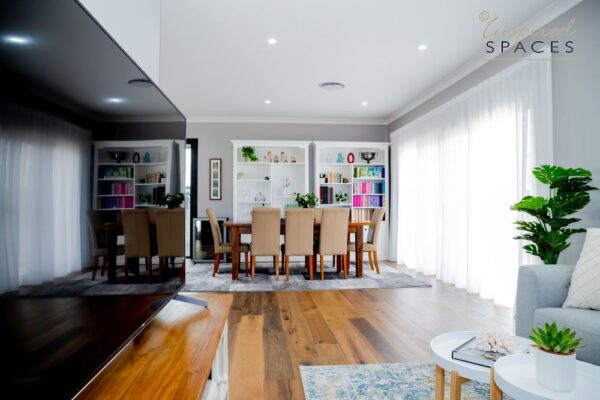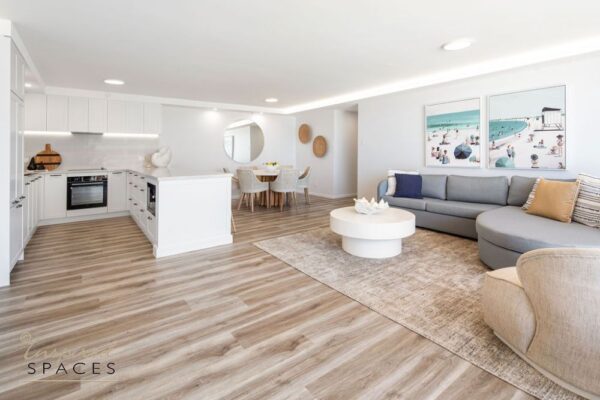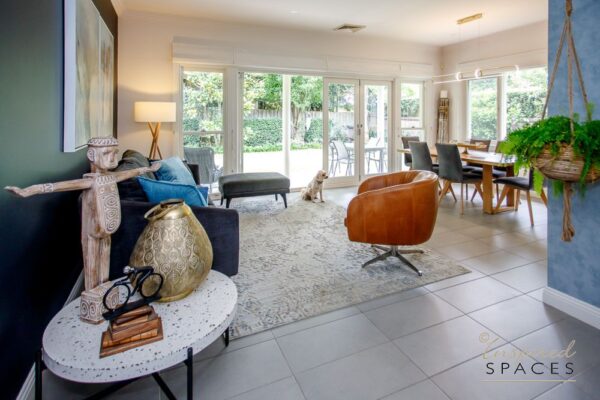Timber flooring, vinyl flooring or tiled flooring? Which one do you choose?
When you build or renovate, deciding the flooring is one of the most important decisions. It is after-all, a crucial element in interior design. Your flooring impacts the aesthetics of your home as well as functionality and the overall feel of a space.
There are many flooring options available these days, but there are three that are the most popular: timber flooring, vinyl flooring and tile flooring. Each of them have their own characteristics and of course, their pros and cons.
Our blog this week outlines some benefits and drawbacks for each of the three flooring options. And hopefully will help you make an informed decision about which one is right for your space.
If you’re tossing up between timber or tiles then have a look at each of their advantages and disadvantages.

Advantages Of Timber Flooring In Residential Design
- Timber looks aesthetically pleasing in most homes or spaces, adding warmth and character to a room and doesn’t date.
- It’s a tough, durable material and long lasting.
- Timber is easy to clean and has low maintenance.
- There’s a wide variety of timber colours, finishes and styles.
- Timber can be used in hallways, living areas, kitchens, dining rooms and bedrooms.
- It has great insulator properties.
- Timber is environmentally friendly with newer timber harvesting methods and the presence of rules and regulations followed by tree cutters and controlled foresting practices. Timber flooring is one of the most eco-friendly flooring options available in the market, as they have a minimal effect on the environment.
- Having timber floors can add value to your property.
- If you’re already sold on timber, have a look on how to choose the right timber flooring.
Disadvantages Of Timber Flooring In Your Space
- The cost of timer is high initially.
- It’s not recommended for wet areas.
- Some maintenance may be required i.e. standing, staining, waxing and polishing.
- Can be slippery.
- Vulnerable to humidity and moisture.
- Noisy to walk on.
- The added cost of rugs, to add softness and warmth also to help reduce the noise.

Advantages Of Vinyl Flooring
- Vinyl flooring comes in a wide range of colours and styles. The most popular currently being designs mimicking the appearance of timber.
- They are low maintenance and resistant to scratches, moisture and stains. Vinyl flooring is easily cleaned, regularly sweeping and occasional mopping are generally all that is required.
- Vinyl flooring is very durable which makes it a great choice for high traffic areas and spaces with pets and children.
- Vinyl flooring is typically a less expensive option to tiles or hardwood.
- Vinyl is relatively easy to lay and can be made to fit any space.
Vinyl flooring has gained popularity over recent years due to the look and feel it gives a space while being durable and well-priced for the budget conscious.
Disadvantages Of Vinyl Flooring
- While vinyl can mimic the look of other materials, it has its limitations and may not have the same authentic feel as hardwood or tiles.
- Unlike hardwood flooring, vinyl has a limited lifespan and will require replacing sooner. Especially in high traffic areas.
- Some vinyl products may contain harmful chemicals posing environmental concerns. When selecting which vinyl product is right for your home, look for low-VOC or phthalate-free options. These are more eco-friendly than others.

Advantages Of Tiled Flooring In Homes
- Tile flooring comes in a wide range of options for example, ceramic, porcelain, granite, marble, slate. The choices are endless.
- They are a strong material making them a great choice for family homes.
- Tiles are moisture and stain resistant.
- They come in more variety of styles, colours, shapes and sizes compared to timber and vinyl, some designs even replicate timber.
- Most types of tiles are eco-friendly. For example, a ceramic tile is considered a green product since it is made with clay and glass tile in most cases are made from recycled glass.
- Tiles are easy to lay and they can be made to fit any space.
- They’re ideal for wet areas such as bathrooms, laundries, kitchens, ensuite, swimming pools.
- Tiles are an affordable flooring solution also installation.
Disadvantages Of Tiled Flooring In Your Space
- Tiles can be hard and cold on the feet.
- They can crack and chip over time especially in high traffic areas.
- Tiles can be slippery when wet. So, care must be taken in wet areas depending on your tile choice.
- The grout between tiles can discolour over time and is hard to maintain and keep clean.
- Some tiles types need to be sealed yearly for example vinyl and marble.
Which Flooring Will You Choose?
Making a decision that is right for you and your family depends on your specific needs, budget and aesthetic preferences.
Begin by considering your lifestyle, each space and how it will be used. And of course, your budget is important as well as your long-term plans. If you plan to move house within a year or two, then a durable but attractive, budget friendly flooring option would be best suited. On the other hand, if you’re plannings on staying long-term in your home you may steer you towards spending a little more for a timeless product with warmth and character.
By weighing up all the pros and cons, you can make an informed decision on what best suits your needs.





Can some one assist me to choose between timber vs tile for my unit ?
Hi Preety
You will need to check your strata by laws re what is permitted re flooring and acoustics to prevent noise transfer. If all things are equal I select timber over tiles because they are softer underfoot, warmer, don’t date like tiles and any damage can be seen as character to the timber whereas damage to tiles is just that. Hope this helps